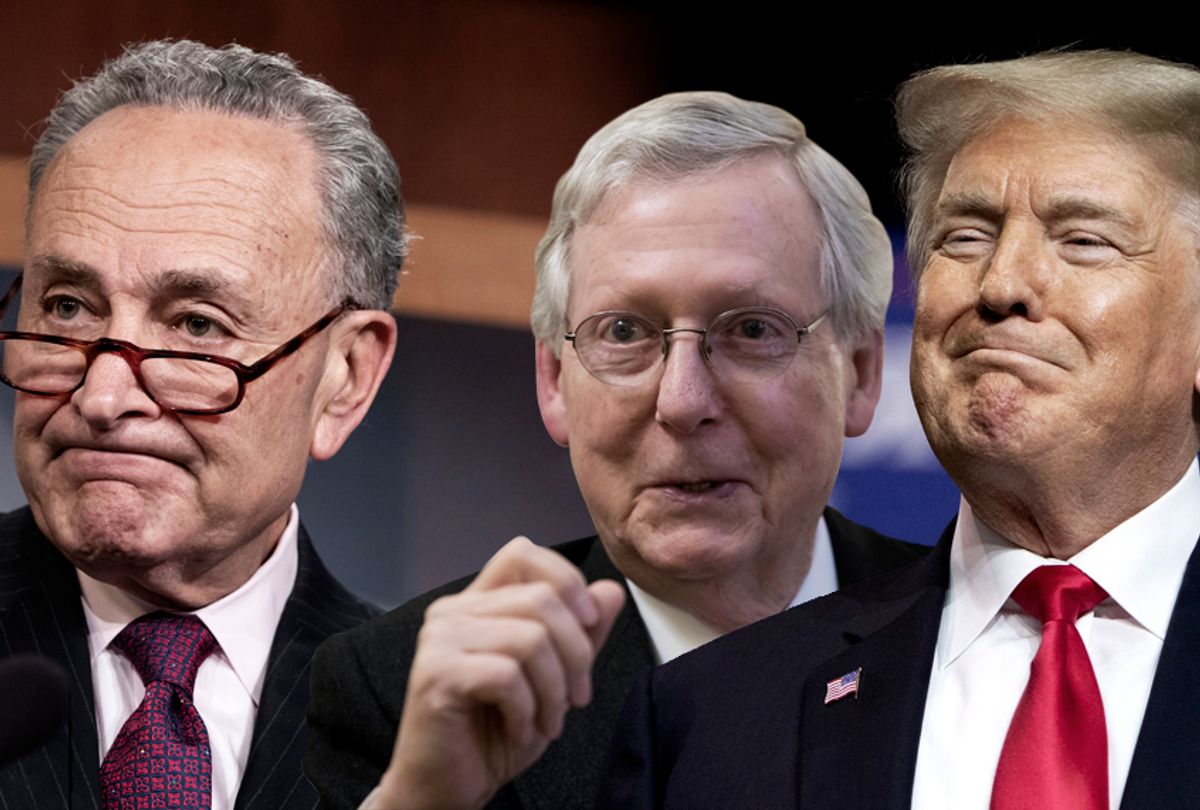Senate Minority Leader Chuck Schumer found himself under fire on Thursday when Democrats blasted him for allowing Republicans to push through President Donald Trump's judicial nominees with minimal fuss.
Schumer has evidently cut a deal with Senate Majority Leader Mitch McConnell that allow 11 of Trump's judicial nominees to be immediately confirmed and another eight to get confirmation votes next week, according to CNN. McConnell had initially cancelled the August recess in an effort to ensure that Congress would push through Trump's picks for various court positions. Democratic delays seemed to guarantee that the legislative session would drag on all the way to the Labor Day holiday, even as lawmakers themselves ached to spend some time at home.
Thanks to the reported deal between Schumer and McConnell, 11 of Trump's nominees judges will go through this week — with some being confirmed by nothing more than a voice vote — so that senators can spend a couple days at home with their families, campaigning or both. Next week they will return to finish up voting and attend the funeral of Sen. John McCain.
The liberal view of this decision was perhaps best summed up by Jennifer Bendery and Igor Bobic of The Huffington Post:
It’s a major win for Trump and McConnell, whose No. 1 priority is filling up federal courts with conservative judges ― many of whom are incredibly anti-abortion, anti–LGBTQ rights and anti–voting rights. Trump has gotten 26 circuit court judges confirmed, more than any other president at this point in his term. Another way of putting it: 1 in 7 U.S. circuit court seats is now filled by a judge nominated by Trump.
Add that Trump put Neil Gorsuch on the Supreme Court and is poised to get another justice through, Brett Kavanaugh, and you’ve got a president drastically reshaping the nation’s courts for generations.
According to Bloomberg, Trump has already managed to appoint 33 district court judges, 26 appeals court judges and a Supreme Court judge (Neil Gorsuch), for a total of 60.
"Democrats need to start to care about judges as much as Mitch McConnell does and play for keeps, which means not being willfully blind to ideological nominees from this president," Brian Fallon, a former Schumer aide who is now executive director of Demand Justice, a progressive judicial advocacy group, told the Daily Beast.
READ MORE: In the wake of Mollie Tibbetts' death, don't blame immigrants for murder. Blame men
One interpretation, noted by the Texas Tribune, is that Trump is making the rest of America's courts look more like notoriously conservative Fifth Circuit court, which covers Texas, Louisiana and Mississippi:
Trump entered office with more vacancies on the federal bench than many of his predecessors, thanks in part to the machinations of Senate Majority Leader Mitch McConnell, R-Kentucky. The president’s judicial nominations outfit, centered in the White House Counsel’s Office, has been uncharacteristically efficient, churning out a steady stream of judges who are highly qualified — and, critics say, highly ideological — and sending them down the conveyor belt for confirmation by the U.S. Senate.
“Despite all the chaos in Trump world … the president’s judicial nominees team is a finely operating machine,” said Josh Blackman, a prominent conservative lawyer and a law professor at South Texas College of Law Houston.
That articl goes on:
Trump has already appointed more than one in eight active appeals court judges, and he’s on pace to confirm more. Those figures stand out more in some places than others: On traditionally liberal circuits, Trump has a chance to make lasting ideological shifts.
“The real legacy of the Trump administration is that the 5th Circuit will not be an outlier,” said Steve Vladeck, a University of Texas Law professor.
While it's impossible to know what went on in the back-room deal between Schumer and McConnell, it likely happened for two reasons: First, Schumer recognized that Democrats wouldn't actually be able to block Trump's judicial nominations, so any attempt to filibuster would have been symbolic rather than substantive; second, Schumer probably didn'yt anticipate the backlash that might ensue from capitulating to Republicans on this issue.
While judicial appointments shape Americans' lives on issues ranging from gun control and LGBT rights to workers' ability to unionize and businesses' ability to make campaign donations, most Americans don't think about judges when casting their presidential votes. That, in itself, explains why Republicans have been so effective at stacking the judicial deck in their favor.
Another factor is that Republicans have been very successful in using obstruction when it benefits them (such as when they thwarted Merrick Garland and dozens of other judicial appointments by Barack Obama) and also at painting Democrats as obstructionists when they try to use the exact same tactics for themselves (such as with the doomed efforts to halt Neil Gorsuch's appointment to the Supreme Court).
With the midterm elections looming and the Democratic Party facing some level of internal disarray, it's a bad moment for the party to once again appear to be on the defensive. Sometimes symbolic battles are important too.



Shares